“La revolución no será limpia, ni bonita ni veloz…”
Pat Parker
For the white person who wants to know how to be my friend
The first thing you do is to forget that i’m Black.
Second, you must never forget that i’m Black.
You should be able to dig Aretha,
but don’t play her every time i come over.
And if you decide to play Beethoven – don’t tell me
his life story. They made us take music appreciation too.
Eat soul food if you like it,
but don’t expect me to locate your restaurants
or cook it for you.
And if some Black person insults you,
mugs you, rapes your sister, rapes you,
rips your house, or is just being an ass –
please, do not apologize to me
for wanting to do them bodily harm.
It makes me wonder if you’re foolish.
And even if you really believe Blacks are better lovers than
whites – don’t tell me. I start thinking of charging stud fees.
In other words – if you really want to be my friend – don’t
make a labor of it. I’m lazy. Remember.
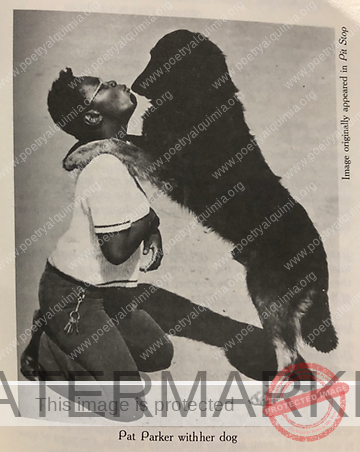
Sweet Sweet Jimmy
Your words are razors
cutting through coke
swift, grinding
and the world listens
The sharpness of your anger
frightens – they scuttle
to contain you –
The new Richard Wright
and the anger rises
Sweet Sweet Prince Jimmy
Are you resting well?
Does sleep cool the rage?
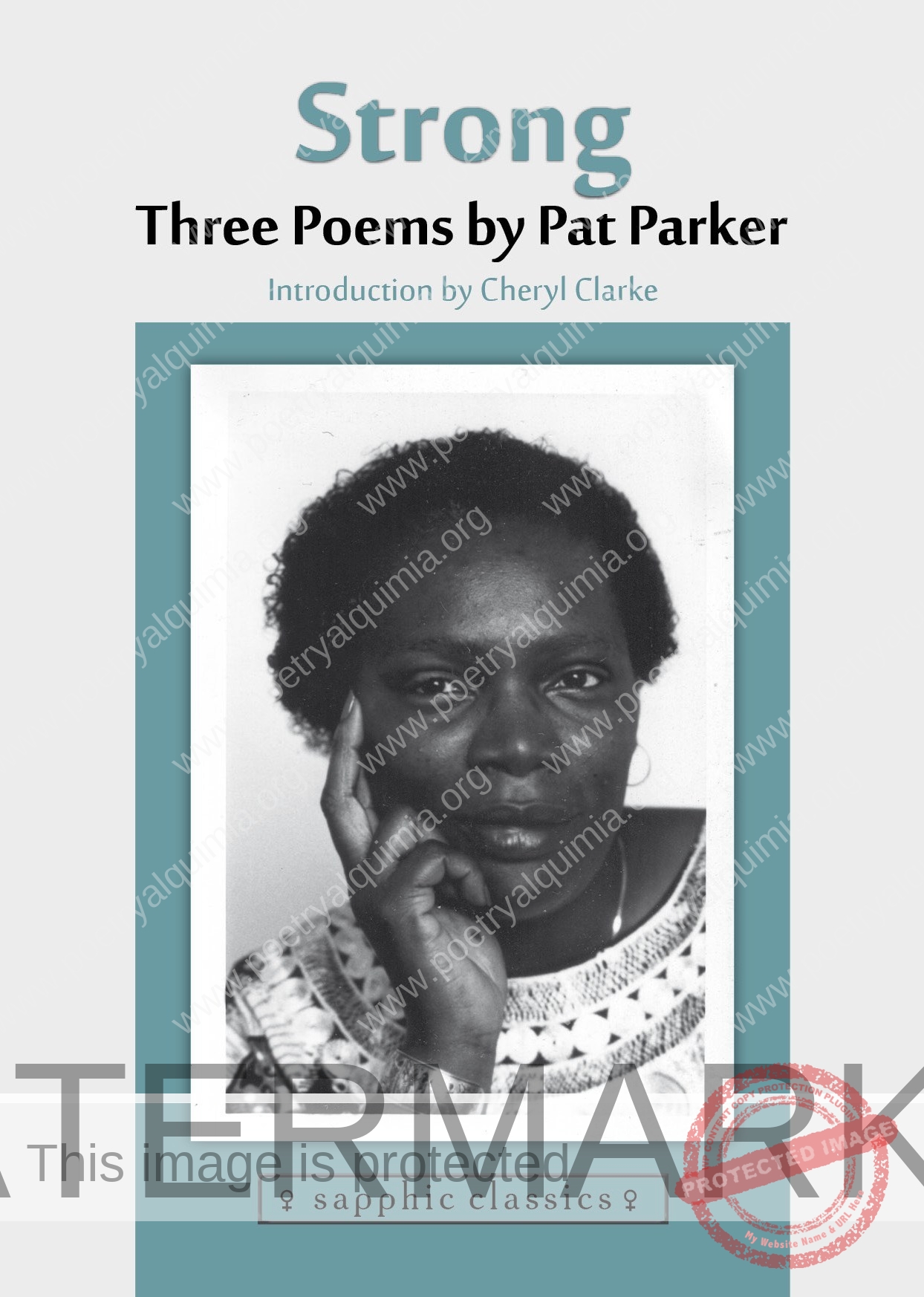
Questions
“Until all oppressed people
are free—
none of us are free.”
I.
the chains are different now—
lay on this body strange
no metal clanging in my ears
chains laying strange
chains laying light-weight
laying credit cards
laying welfare forms
laying buying time
laying white packets of dope
laying afros & straightened hair
laying pimp & revolutionary
laying mother & daughter
laying father & son
chains laying strange—
strange laying chains
chains
how do i break these chains
II.
the chains are different now—
laying on this body strange
funny chains—no clang
chains laying strange
chains laying light-weight
chains laying dishes
chains laying laundry
chains laying grocery markets
chains laying no voice
chains laying children
chains laying selective jobs
chains laying less pay
chains laying girls & women
chains laying wives & women
chains laying mothers & daughters
chains laying strange
strange laying chains
chains
how do i break these chains
III.
the chains are still here
laying on this body strange
no meta—no clang
chains laying strange
chains laying light-weight
chains laying funny
chains laying different
chains laying dyke
chains laying bull-dagger
chains laying pervert
chains laying no jobs
chains laying more taxes
chains laying beatings
chains laying stares
chains laying myths
chains laying fear
chains laying revulsion
chains laying strange
strange laying chains
chains
how do i break these chains
IV.
the chains are here
no metal—no clang
chains of ignorance & fear
chains here—causing pain
how do i break these chains
to whom or what
do i direct pain
Black—white
mother—father
sister—brother
straight—gay
how do i break these chains
how do i stop the pain
who do I ask—to see
what must i do—to be free
sisters—how do i break your chains
brothers—how do i break your chains
mothers—how do i break your chains
fathers—how do i break your chains
i don’t want to kill—
i don’t want to cause pain—
how—
how else do i break—your chains

My Lover Is a Woman
I.
my lover is a woman
& when i hold her
feel her warmth
i feel good
feel safe
then—i never think of
my family’s voices
never hear my sisters say
bulldaggers, queers, funny
come see us, but don’t
bring your friends
it’s ok with us,
but don’t tell mama
it’d break her heart
never feel my father
turn in his grave
never hear my mother cry
Lord, what kind of child is this?
II.
my lover’s hair is blonde
& when it rubs across my face
it feels soft
feels like a thousand fingers
touch my skin & hold me
and i feel good
then—i never think of the little boy
who spat & called me nigger
never think of the policemen
who kicked my body & said crawl
never think of Black bodies
hanging in trees or filled
with bullet holes
never hear my sisters say
white folks hair stinks
don’t trust any of them
never feel my father
turn in his grave
never hear my mother talk
of her backache after scrubbing floors
never hear her cry
Lord, what kind of child is this?
III.
my lover’s eyes are blue
& when she looks at me
i float in a warm lake
feel my muscles go weak with want
feel good
feel safe
then—i never think of the blue
eyes that have glared at me
moved three stools away from me
in a bar
never hear my sisters rage
of syphilitic Black men as
guinea pigs
rage of sterilized children
watch them just stop in an
intersection to scare the old
white bitch
never feel my father turn
in his grave
never remember my mother
teaching me the yes sirs & ma’ams
to keep me alive
never hear my mother cry
Lord, what kind of child is this?
IV.
& when we go to a gay bar
& my people shun me because i crossed
the line
& her people look to see what’s
wrong with her
what defect
drove her to me
& when we walk the streets
of this city
forget and touch
or hold hands
& the people
stare, glare, frown, & taunt
at those queers
i remember
every word taught me
every word said to me
every deed done to me
& then i hate
i look at my lover
& for an instant
doubt
then—i hold her hand tighter
& i can hear my mother cry.
Lord, what kind of child is this?
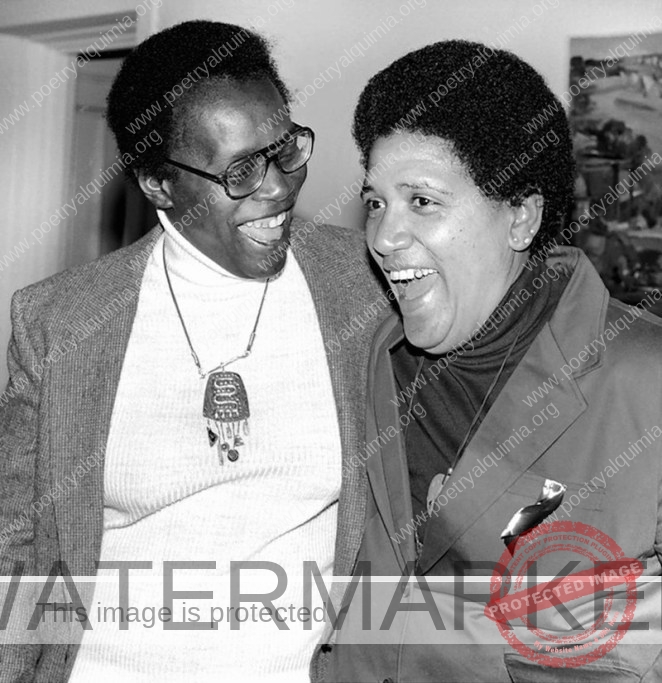
A Small Contradiction
It is politically incorrect
……………… to demand monogamous
…………………………relationships —
It’s emotionally insecure
to seek
…………ownership of
another’s soul
……….or body …..&
damaging to one’s psyche
to restrict the giving and
…………….taking of love.
Me, i am
totally opposed to
monogamous relationships
…………..unless
…………..I’m
………….In love.
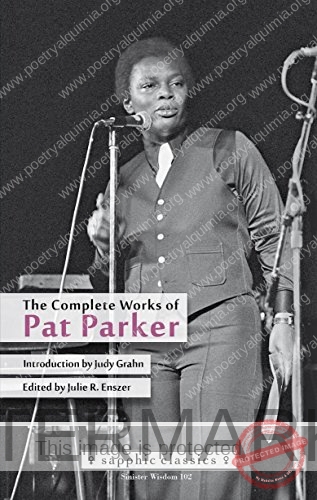
Don’t let the fascist speak
“Don’t let the fascist speak.”
“We want to hear what they have to say.”
“Keep them out of the classroom.”
“Everybody is entitled to freedom of speech.”
I am a child of America
a stepchild
raised in the back room
yet taught
taught how to act
in her front room.
my mind jumps
the voice of students
screaming
insults threats
“Let the Nazis speak”
“Let the Nazis speak”
Everyone is entitled
to speak
I sit a greasy-legged
Black child
in a Black school
in the Black part of town
look to the Black teacher
the Bill of Rights
guarantees
us all the right
my mind
remembers chants
article I article I
& my innards churn
they remember
the Black teacher
in the Black school
in the Black part
of the very white town
who stopped
when we attacked
the puppet principal
the white Board
of mis-Education
cast-off books
illustrated with
cartoons &
words of wisdom
written by white
children in the
other part of town
missing pages
caricatures
of hanging niggers —
the bill of rights
was written to
protect
us
my mind remembers
& my innards churn
conjures images
police
break up
illegal demonstrations
illegal assemblies
conjures images
of a Black Panther
“if tricky Dicky
tries to stop us
we’ll stop him”
conjure image
of the same Black man
going to jail
for threatening
the life of
THE PRESIDENT
every citizen
ins entitled to
freedom of speech
my mind remembers
& my innards churn
conjure images
of jew in camps
of homossexuals in camps
of socialists in camps
“Let the Nazis speak”
“Let the Nazis speak”
faces in a college
classroom
“You’re being fascist too.”
“We want to hear what
They have to say”
faces in
a college classroom
young white faces
speak let them speak
speak let them speak
Black, jews some whites
seize the bullhorn
“We don’t want to hear
your socialist rhetoric”
socialist rhetoric
survival
rhetoric
the supreme court
says it is illegal
to scream fire
in a crowded theater
to scream fire
in a crowded theater
causes people to panic
to run to hurt each other
my mind remembers
& now i know
what my innards
say
illegal to cause
people
to panic
to run
to hurt
there is
no contradiction
what the Nazi say
will cause
people
to hurt
ME.
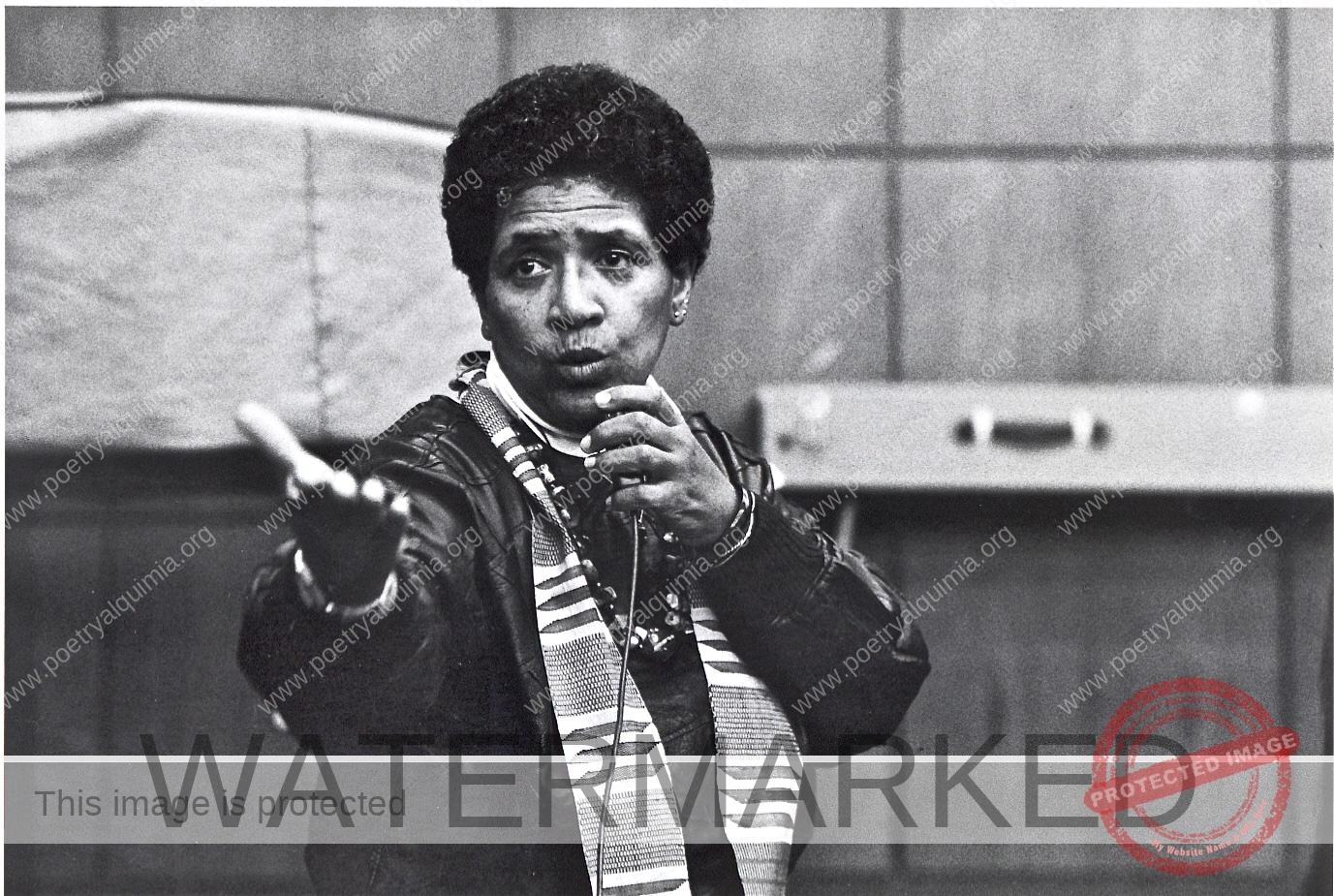
Of Life
I though if i were a sparrow,
I’d be free to fly and live;
I found out about the Hawk.
I thought if I was rich,
things would be my way,
then I learned about taxes.
I said if I were a man…
Then I learned.
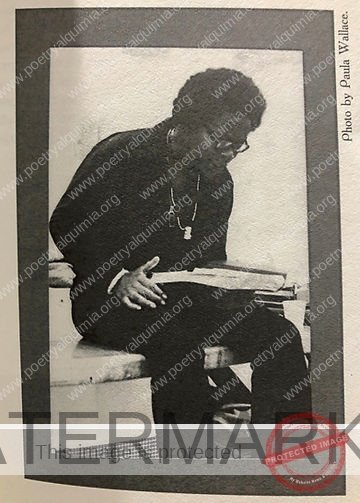
Patricia Cooks conocida como Pat Parker (Houston,EE.UU., 20 de enero de 1944 – Oakland, EE.UU., 17 de junio de 1989). Poeta, feminista y activista afroamericana.
Hija de Marie Louise (de soltera Anderson) y Ernest Nathaniel Cooks. Su poesía habla de su dura infancia creciendo en la pobreza, lidiando con agresiones sexuales y el asesinato de su hermana mayor a tiros por su esposo. Se fue de casa a los diecisiete años y se mudó a Los Ángeles, California, para asistir a la universidad. Obtuvo una licenciatura en Los Angeles City College y realizó un postgrado en San Francisco State College.
En 1962, con 18 años, se casó con el dramaturgo Ed Bullins de quien se separó cuatro años después . Pat dijo que su exmarido era físicamente violento y que estaba “muerta de miedo”. Posteriormente se casó con Robert F. Parker, escritor y editor, pero se dió cuenta de que el matrimonio no era para ella y se divorciaron .
Parker dio su primer recital de poesía público en 1963 en Oakland y en 1968, empezó a leer su poesía a los grupos de las mujeres en librerías de mujeres, cafés y encuentros feministas. Con la poeta Judy Grahn y otras desarrolló una comunidad en torno a la poesía lésbica.
En 1972 publicó su primer volumen de poesía: Child of Myself. Estuvo implicada en el Movimiento Pantera Negra, en 1978-79 se involucró con las Voces Diversas de Mujeres Negras, un grupo de poetas y músicas en el que estaba Linda Tillery, Mary Watkins y Gwen Avery.
En 1978 se publica su libro Movement in Black en Estados Unidos; sus poemas son un manifiesto contra la sociedad; una denuncia de la discriminación racial y sexual y el sistema policial y judicial norteamericano.
En 1980 fundó el Consejo Revolucionario de las Mujeres Negras, y apoyó la formación del Colectivo Mujeres de Prensa además de implicarse en el activismo organizado de gays y lesbianas.
Pat Parker y Audre Lorde se conocieron en 1969 e intercambiaron cartas y visitas hasta la muerte de Parker. Su colaboración inspiró entre otros a la cantante lesbiana-feminista Nedra Johnson, cuya canción “Where Will You Be?” se convirtió en un himno feminista en los EE. UU.
Pat Parker se definía a si misma como poeta, negra, lesbiana y feminista porque tal y como expresó en una entrevista publicada por primera vez en 1975 por Hera:
« Promocionarme a mí misma como una poeta lesbiana negra desanima a algunas personas, pero tengo que ser honesta. Si solo dijera que soy una poeta negra, entonces ciertas personas vendrían esperando cierta cosa. Entonces oirían poesía lesbiana y les molestaría o asustaría. Si me catalogo a mí misma como una poeta feminista, entonces habrá gente que se molestará por el lesbianismo y por la poesía negra que escribo. Ya que soy todas esas cosas, quiero tenerlo todo para que cuando venga la gente sepa exactamente lo que va a haber allí. Porque no puedo mentir sobre lo que viene, ¿sabes? Eso para mí es incluso peor que no decir nada en absoluto…»
«…Por supuesto, sé cómo es; Sé que la gente puede perder sus trabajos detrás de esto, pero creo que la gente siempre perderá sus trabajos detrás de esto a menos que más personas comiencen a salir. Sabes, cuando empiecen a cambiar esas leyes para que no te puedan despedir porque eres gay, entonces no tendrán que preocuparse por estar en el armario. Pero alguien tiene que dar ese paso. Alguien tiene que ponerse de pie y decir: ‘¡Aquí estoy!’»
Parker murió el 19 de junio de 1989 a los 45 años en Oakland, California.
En junio de 2019, Parker fue una de los cincuenta ” pioneros y héroes ” estadounidenses inaugurales incluidos en el Muro de Honor Nacional LGBTQ dentro del Monumento Nacional Stonewall (SNM) en el Stonewall Inn de la ciudad de Nueva York .
El premio de poesía Pat Parker se otorga cada año por un poema narrativo en verso libre o un monólogo dramático de una poeta lesbiana negra.
Obra publicada :
- Child of Myself (1972), El colectivo de prensa de mujeres
- Pit Stop (1973), el colectivo de prensa de mujeres
- Womanslaughter (1978), Diana Press
- Movimiento en negro (1978), Diana Press
- Jonestown y otras locuras (1989), Firebrand Books
- Movimiento en negro: la poesía recopilada de Pat Parker, 1961-1978; incluye trabajo de Child of Myself y Pit Stop , prólogo de Audre Lorde, introducción de Judy Grahn, Diana Press (Oakland, California), 1978, edición ampliada, introducción de Cheryl Clarke, Firebrand Books (Ithaca, Nueva York), 1999.
Enlaces de interes:
THE RELEVANT QUEER: Feminist Poet and Activist Pat Parker, Born January 20, 1944
Para la mujer blanca que quiere saber cómo ser mi amiga: una guía feminista negra para la solidaridad interracial
